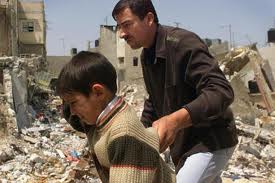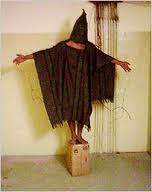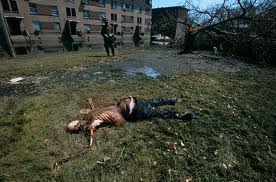MODULE 10: Iraq, Afghanistan, Palestine, New Orleans
They’re Building A Wall (2002)
Not long after Sharon’s Jerusalem massacre that led to the Second Intifada, the Israeli government had began a massive wall-building project. The wall was never intended to be a wall along the 1967 internationally-recognized boundaries, but a thing that snakes through the West Bank in order to rob even more land from Palestinians, while creating protected bubbles for all the Jewish-only settlements. The wall creates a series of isolated, unsustainable geographical entities that resemble prisons far more they resemble villages.
Israel’s wall-building of course comes along with the US administration’s swelling rhetoric about fighting the “War On Terror” in Afghanistan and especially now, Iraq. Israeli leaders are now constantly mimicking US rhetoric, but they replace Palestinian leaders with the people Bush would be talking about, such as Osama Bin Laden.
In some kind of extremely bleak physics lesson, after the Israeli military bulldozed and slaughtered their way through a refugee camp in Jenin, killing scores of people, the next suicide bomber was from (drum roll, please) Jenin.
“Jenin”
Global Public Opinion (2003)
The corporate media in the US had had a policy of completely ignoring major protests for the most part – except for local media, when a major protest was coming to town and it would be too weird to ignore it. But on February 15th, 2003, even the US media paid attention, as an estimated 13 million people around the world came together on the same day to register their objection to the US plans to invade Iraq.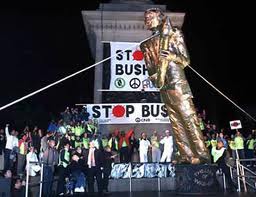
Towns and cities across the US participated, many breaking records for the biggest protest ever in one town or another. This was perhaps the peak of the antiwar movement that grew quickly out of the ashes of 9/11 and remained a significant presence in US society until the fall of 2005 or thereabouts, after which it really fizzled out – as a mass movement, anyway.
Whether the protests affected US government policies is impossible to know for sure. It didn’t stop the US from invading Iraq, in any case. Whether it affected other related decisions will probably never be known.
“Trafalgar Square”
The Death of Rachel Corrie (2003)
The International Solidarity Movement, a network of people mainly involved with solidarity with Palestinians, had been gaining more attention since it formed after the outbreak of the Second Intifada. ISM volunteers were regularly putting their lives on the line to try to stop homes from being demolished or children from being shot by soldiers.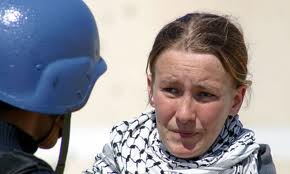
In March, 2003, just days before the US would launch its latest invasion of Iraq, ISM volunteer Rachel Corrie was killed by an Israeli soldier driving an armored bulldozer. She was from Olympia, Washington, where you’ll find a large mural in her memory in the center of town.
People like Rachel losing their lives affects different people in different, often profound ways. Of course, for people who knew her, losing a friend or daughter so young is devastating. But people losing their lives while practicing this kind of solidarity – sitting in front of an armored bulldozer – is deeply moving to those on behalf she was attempting to intervene, as well as to those back home who identify themselves as part of the social movement background that the person came from. For those who had just done something along the lines of what Rachel was doing, or were just making plans to do something similar, for example.
“The Death of Rachel Corrie”
Operation Iraqi Liberation (2003)
After 9/11 all the talk was about Al-Qaeda and Osama Bin Laden, who was supposed to be hiding out somewhere in Afghanistan. But then the attention of the US imperialists quickly turned to Iraq – which was run by a secular government that despised Al-Qaeda and regularly killed that crowd in large numbers. But although no one was seriously making the case that Saddam Hussein had anything to do with 9/11, he had Weapons of Mass Destruction, and so he was a danger to the western world.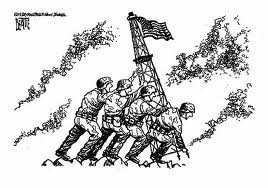
Of course, Israel had much more powerful Weapons of Mass Destruction, among other countries. But what really mattered, evidently were the chemical weapons in Iraq, which previous US administrations had helped them develop.
Colin Powell lied 31 times in a row at the UN, and US politicians from both parties acted like they believed him, even though most people in the world thought he was lying, which it turned out he was – all 31 times.
And then the US went to war for oil. Everyone knew that’s what it was about, if you’re attacking a country like Iraq, of course it’s about oil. But the powers-that-be did their whole fig leaf dance, plausible denial nonsense, and then they went about destroying Iraq and slaughtering its people for several years.
Initially, they actually called it Operation Iraqi Liberation, until some swift aid realized this might not be funny, and they changed it to Operation Iraqi Freedom.
Spanish Journalists Strike (2003)
“If it bleeds it leads,” as the saying goes. Wars are sensational, and sensational sells, so if media outlets and journalists aren’t really savvy, they can easily end up being stenographers for the empire.
Journalists in Spain, recognizing that reality, took an unusual move at one of the conservative prime minister’s press conferences, just after the outbreak of war in Iraq, which at the time Spain was part of. The prime minister stepped up to speak, and all the journalists put down their pens, notebooks, microphones and cameras, and they turned their backs on him.
Spain at this time was a powerful example of how a well-educated, sufficiently skeptical public can avoid being dragged into nationalistic military adventures. When Madrid’s subway system was bombed by Al-Qaeda, the response of Spanish voters who went to the polls very soon afterwards was not to vote in the pro-war ruling conservative party again as one might expect, but the opposite – they voted in the socialists, who were opposed to Spanish troops participating in the invasion of Iraq, and soon after the election, the Spanish troops came home.
“Spanish Journalists Strike”
Mission Accomplished (2003)
President Bush got on an aircraft carrier off the coast of California and announced that the war was over in Iraq and the mission was accomplished. As the country was in poverty-stricken ruins at the time, one must wonder what the mission was that had evidently just been accomplished. It was almost immediately after this speech on the aircraft carrier that the Sunni insurgency in Iraq really kicked off.
“The War Is Over”
The Miami Model (2003)
Whenever the anti-capitalist movement was organizing a big protest around a summit meeting (G8, IMF, WTO, etc.) there would be lots of fear-mongering in the local media about the crazed anarchists who were going to be descending on the town and destroying everything. By the time the protests were actually happening, the police and media had often managed to create such an atmosphere of fear that most of the businesses closed up and sometimes boarded their windows in preparation for whatever might be coming.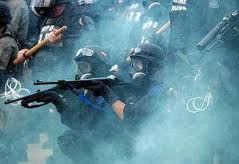
And protesters coming in to town could be sure that the reception of the local riot police would be violent. This was a certainty. This was very true before 9/11, but after 9/11 the element of potential violence just seemed unknown. The level of violence in Miami at the FTAA meetings in 2003 was on a scale that most present had never witnessed. The entire downtown was literally drenched in tear gas.
“Miami”
Catching Songbirds in Gaza (2003)
There’s a market for songbirds in Palestine. So to supplement their family’s often very meager income, children will venture out into the olive groves near the fence separating the Gaza Strip from Israel, looking for birds. Ten-year-old Mahmud Al-Qayyed was shot and killed by an Israeli sniper for looking for songbirds too close to the fence one day in 2003. He was neither the first nor the last child to be killed for exactly the same reason, in the same grove of olive trees.
“Song the Songbird Sings”
The US had lost all moral legitimacy when it started holding people in indefinite detention without trial in Guantanamo Bay in 2001. So there was no moral high ground to lose by 2004, when the scandal broke that in the US-run Abu Ghraib prison near Baghdad, US soldiers had been systematically torturing and sexually humiliating Iraqi prisoners.
“After We Torture Our Prisoners”
Tsunami (2004)
A massive tsunami swept through big chunks of Asia, killing over a hundred thousand people.
“Tsunami”
Camp Casey (2005)
The last big resurgence of anti-war sentiment on a national scale in the US was in the summer of 2005, during Cindy Sheehan and friends’ occupation of a bit of land outside of George W Bush’s ranch in Crawford, Texas.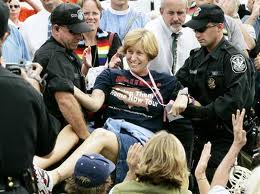
It was another one of those moments where you can usually rely on the media to ignore these sorts of things, except when you can’t. It was a slow news month in Texas that August, and for whatever other reasons, the media paid attention to Cindy. She became the voice of a movement, and many thousands made the pilgrimage to Crawford in the miserable, swampy August heat to be part of this statement, in solidarity with all the parents who lost children to war – especially a war led by a man who can’t find the words to explain to a grieving mother why her son had to die.
“Song for Cindy Sheehan”
From the anti-war movement to the war at home. Rising wind speeds as a result of climate change worldwide, increased chances of catastrophic hurricanes, and one arrived – at least one catastrophic enough to overwhelm the failing infrastructure that New Orleans had to offer as a defense. Then add racism to the equation, and you have chaos, thousands dead, a city in ruins.
In a bizarre twist, the hurricane was so deadly because of infrastructure that wasn’t maintained because too much US tax money, generally, goes to the military instead of things like levies and railroad bridges. In the aftermath of the hurricane, some of the overpaid private security contractors working the streets were from the very same contractors then patrolling the streets of Baghdad as well.
Paul Wolfowitz (2005)
The anti-capitalist movement in the US was predominantly very young, average age around 22. The anti-war movement of a few years later was an older crowd by and large, average age probably close to 60. There was significant crossover between the two movements, but they were mostly different.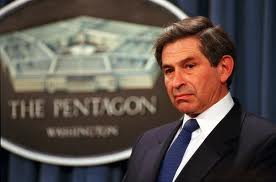
With the forces both movements were opposing, however, there was much more fluidity. A prime example of this sort of thing was neocon Paul Wolfowitz. As the main guy in charge of the occupation of Iraq, he implemented all kinds of economic privatization schemes. Then in 2005 he got the job of heading up the World Bank, where he would have the opportunity to do that sort of thing to many more countries – countries agreeing to the privatization measures in order to qualify for loans, rather than because they had had their government violently overthrown by the US military.
“Paul Wolfowitz”
Questions/thoughts for further exploration…
They’re Building A Wall (2002)
As offensive as walls can be generally, there are differences between them. The walls between the US and Mexico or between East and West Germany or surrounding China are on internationally-recognized borders. The wall in the West Bank isn’t on a border at all.
Jenin (2002)
Predictably, the first suicide bomber to strike inside Israel after the Israeli military invaded the city of Jenin and killed scores of people was from Jenin. Which of these events qualify as “terrorism”? What is “terrorism”?
Trafalgar Square (2003)
When the global antiwar protests on February 15th, 2003 were so successfully huge, many people hoped they would change the course of world events. Were they right to believe this?
The Death of Rachel Corrie (2003)
Rachel Corrie, a recent college graduate from Olympia, Washington, became a martyr in Palestine when she was run over by an armored bulldozer while sitting in front of a family’s home in Gaza. What are the differences in the ways people react to the death of a foreign activist compared to the death of a local person?
Operation Iraqi Liberation (2003)
Was the US invasion and occupation of Iraq in 2003 related to the fact that Iraq is one of the most oil-rich countries on Earth?
Spanish Journalists Strike (2003)
Normally journalists cover the news. But when they collectively turn their backs on the prime minister, they become the news. Should journalists also be activists? Are they ever objective?
The War Is Over (2003)
President Bush made a very dramatic speech from an aircraft carrier announcing the war was over – “mission accomplished” in Iraq. Then the insurgency started. Why was he so spectacularly wrong in his assessment of the situation?
Miami (2003)
The last major protest for the anti-capitalist movement of the period was outside the Free Trade Area of the Americas meetings in Miami, Florida. The city was drowned in tear gas. Why did the state respond with such overwhelming force to this movement?
Song the Songbird Sings (2003)
If children keep getting killed by military snipers in the same area for the crime of catching songbirds too close to the border fence, why don’t the Israeli authorities change their rules of engagement to avoid killing so many children?
After We Torture Our Prisoners (2004)
The story broke that US soldiers were torturing prisoners at Abu Ghraib. Is torture systematic US foreign policy, or just something that keeps happening by coincidence wherever the CIA goes?
Tsunami (2004)
Given the extent of the death and devastation, how much media coverage would the 2004 tsunami have received if it had occurred in Europe or North America?
Cindy Sheehan (2005)
What were the possible factors that came together to allow Cindy Sheehan to get such extensive media attention during her camp-out outside of President Bush’s Texas ranch?
New Orleans (2005)
Were the residents of New Orleans mainly treated as a population in need of aid or as a threat to law and order in the wake of Hurricane Katrina? Is it a crime to steal diapers or water from a store in an emergency situation when all the stores are closed and you need diapers or water?
Paul Wolfowitz (2005)
How is Paul Wolfowitz’s career path a perfect illustration of the connection between US economic and military policies? What is the relationship between the World Bank, neoliberal economics and the occupation of Iraq?

